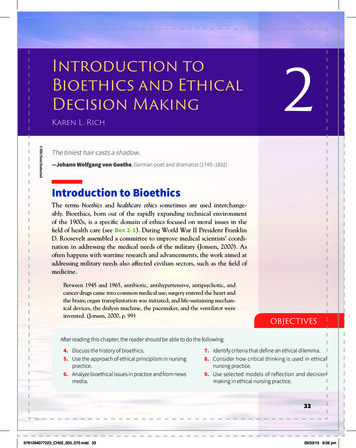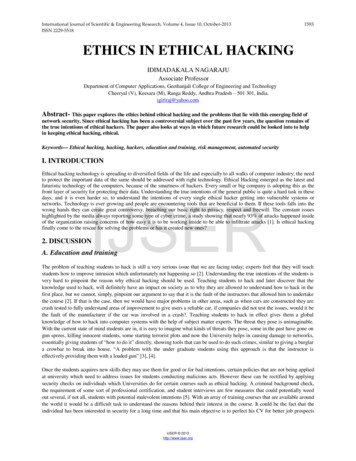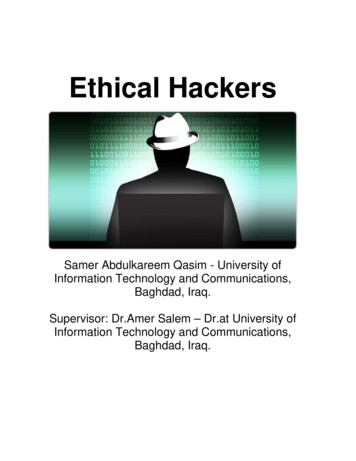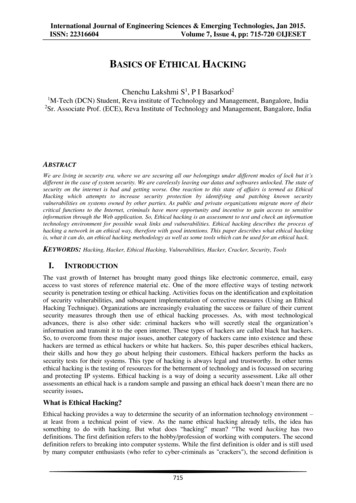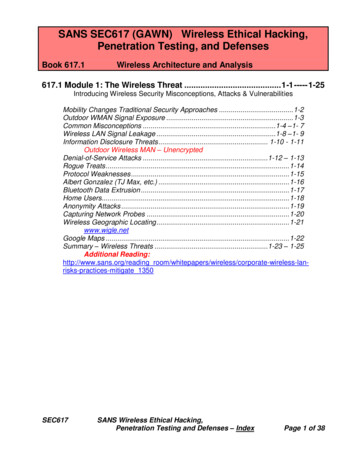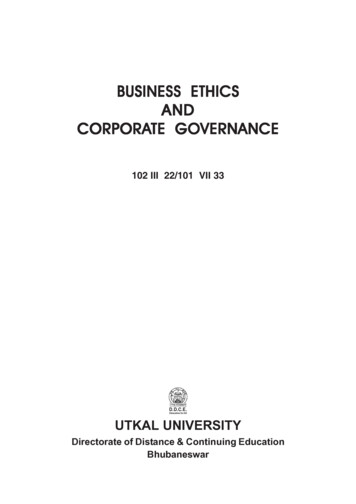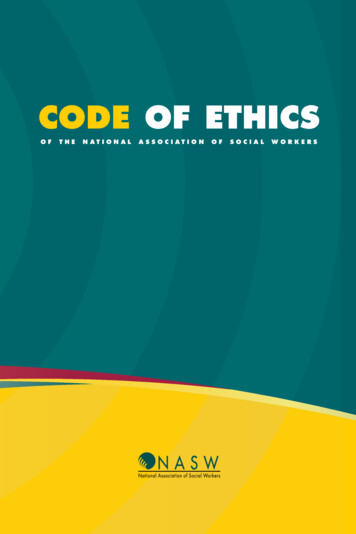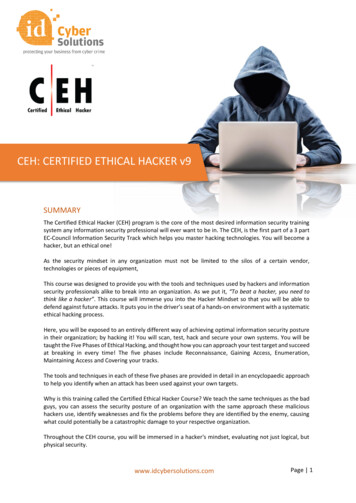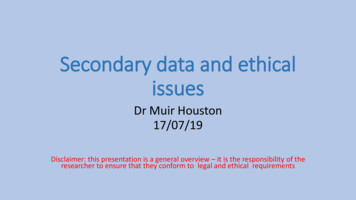
Transcription
Secondary data and ethicalissuesDr Muir Houston17/07/19Disclaimer: this presentation is a general overview – it is the responsibility of theresearcher to ensure that they conform to legal and ethical requirements
Types or forms of secondary data Secondary data containing personal and/orsensitive personal data Open access secondary data Purchased and/or licensed secondary data Restricted secondary data
Secondary data containing personal and/orsensitive personal data Research will require to comply with both GDPR and subject to ethicaloversight and review Access through safe havens for ‘official data’ and subject to disclosurecontrol – data points Social media and social networking data – blurs boundaries betweenprimary and secondary data and also between public and private
Open access secondary data Dataset in the public domain and often considered free fromrestrictions Datasets freely available on the internet – some may requireregistration – but often as bot protection May still be subject to an ‘Open data’’ or ‘Creative Commons’licence and as such may still be subject to certain restrictions andlimitations on use Generally would not be required to obtain ethical approval – butjournals may require a statement to explain why approval notrequired
Purchased and/or licensed secondary data The terms and conditions of the license or contract from thedata supplier or source must be adhered to; and, data shouldnot be used, processed, shared, or distributed beyond thelimits agreed or covered by the license House price data; other commercial datasets; Certain datasets in the UK Data Archive and otherrepositories Ethical approval if personal and/or sensitive personal dataincluded
Restricted secondary data Administrative dataHealth/medical dataSocial security dataCriminal justice system dataEducational data Generally required to access in ‘Safe Haven’ can be physical orelectronic; and subject to strict disclosure controls Ethical oversight – may result in confirmation that ethical approval isnot required
Big Data, sharing and ethics Libby Bishop (2017). Big data and data sharing: Ethical issues. UK Data Service, UK Data 11/big-data-and-data-sharing ethical-issues.pdf Often differ from traditional research data in that they have not beengenerated specifically by researchers for research purposes. As aresult, the usual ethical protections that are applied at several pointsin the research data life cycle have not taken place. big data most commonly used for social research as administrativedata, records of commercial transactions, social media and otherinternet data, geospatial data and image data. (OECD, 2013) Potential issues of privacy and disclosure – ethical oversight and DPIOinput
Social media and online ethics What constitutes 'privacy' in an online environment? How easy is it to get informed consent from the participants in thecommunity being researched? What does informed consent entail in that context? How certain is the researcher that they can establish the ‘real’ identity ofthe participants? When is deception or covert observation justifiable? How are issues of identifiability addressed? How do country-specific legal requirements (eg for data protection) applyin internet-mediated research that crosses national boundaries?ESRC – internet mediated research
Online ethics- general Commonly cited sources: Association of Internet Researchers (AOIR) 2012: Ethical decision-making and Internet research 2.0:Recommendations from the AoIR ethics workingcommittee [PDF] 2012: This chart provides a useful starting point forinternet researchers to consider ethics. 2002: Ethical decision-making and Internet research:Recommendations from the AoIR ethics workingcommittee [PDF]
Issue to be addressed 1Please provide details of the data you wish to collect or access – please includedetails of the platform, app, data archive, API, etc. 2You should have consulted the specific Terms and conditions of the specificplatform or data source; please answer the following: 2.1 What do the terms and conditions say about retention of datasets? 2.2 What are the rules regarding publishing or re-sharing collected data? 2.3 Are there specific provisions within the terms and conditions that permit researchusage of data collected? 2.4 What are the explicit limits on usage that may be relevant for planned researchwork? 3Have you consulted the relevant legal guidelines disciplinary, funder orinstitutional guidelines in relation to the specific ethical concerns research of this naturecan raise? E.g. copyright/Intellectual Property Rights/contracts/licensing/ privacy/GDPR.
An example In 2015 Dan Gray, at the University of Cardiff, used Twitter to study misogynist speech. He encounterednumerous legal and ethical challenges with consent and anonymisation when considering how to fairlyrepresent research participants. He collected some 60,000 Tweets in 2015 by filtering on keywords ofhateful speech and needed to be able to publish selected quotations of Tweets to support hisarguments.Issues, constraints and decisions Twitter’s Terms and Conditions prohibit modifying content, meaning that tweets couldnot be anonymised. Gray had to decide if the Tweets could be considered public, and moreover, wouldtheir public status be sufficient to justify publishing without consent. Survey analysis done at the Social Data Science Lab at Cardiff, where Gray wasconnected, showed that Tweeters did not want their content used, even for research,if they were identifiable. If he did decide to seek consent, there was no way to do so as private communicationto the Tweeter. This would have been possible only if the Tweeters were followinghim, and they were not. Mutual following was not possible as a way of contacting Tweeters because theResearch Ethics Committee required that he use an anonymised profile.
Outcomes He opted to contact by direct Tweet, though this risked allowingtweeters to find him, and also to contact other tweeters of hatefuldiscourse. “Consent by Tweet” severely constrained his ability to explain risksand benefits of the research. Consent was successfully obtained for a number of tweets, enablingsharing of selected unanonymised tweets in publications. Gray was able to draw upon the UK’s COSMOS Risk Assessment forguidance, but points out that its rigorous attention to harm andprivacy can become a barrier, shielding hateful discourse from criticalscrutiny
Ethics in social media research: where are we now? Early on in the research we quickly realised that many of the learnedsociety ethical resources were of little guidance, given their focus onnon-digital data. Where addendums on using Internet data werewritten, they had little to say about social media. Papers were beingpublished in reputable journals with tweets quoted verbatim, withunacceptable and ineffective methods of anonymisation, and withoutinformed consent from users1. . Research on users’ views of therepurposing of their social media data consistently shows that themajority wish to be asked for informed consent if their content is tobe published outside of the platform which it was intended for2.
Resources – do your research BPS (2017) Ethics Guidelines for Internet-mediated 0for%20Internet-mediated%20Research%20(2017).pdf BPS (nd) Supplementary guidance on the USE OF SOCIAL 20on%20the%20Use%20of%20Social%20Media.pdf BSA (2017) Ethics Guidelines and Collated Resources for Digital Researchhttps://www.britsoc.co.uk/media/24309/bsa statement of ethical practice annexe.pdf Social Media Analytics: a survey of techniques, tools and platforms. Bogdan Batrinca and Philip C TreleavenP.C. AI & Soc (2015) 30: 89. https://doi.org/10.1007/s00146-014-0549-4 Big data and data sharing: Ethical issues ata-and-datasharing ethical-issues.pdf Richards, N.M. and King, J.H (2014) Big Data and Ethics, Wake Forest Law ract id 2384174# Zwitter, A. (2014) Big Data Ethics Big Data & Society July–December 2014: 2053951714559253 Council for Big Data, Ethics, and Society https://bdes.datasociety.net/ Uršič, Helena. 2019. “The Right to be Forgotten or the Duty to be Remembered? Twitter data reuse andimplications for user privacy.” Council for Big Data, Ethics, and Society. Accessed March 26, ivacy/ Herschel, R. and Miori, V.M. (2017) Ethics & Big Data, Technology in Society, Vol 49, pp31-36.
Ryan, L. (2016) Navigating ethics in the big data democracy The Visual Imperative: Creating a Visual Culture of Data Discovery2016, Pages 61-84 – B9780128038444000042 Internet based research: Best practice Guidance. University of /default/files/researchsupport/documents/media/bpg 06 internetbased research v. 5.2.pdf Research ethics and data sharing: governance and integrity Louise Corti 2018 -Data-Service-Research-ethics-and-data-sharing.pdf Unpacking the Value of Social Media Work Package 3: Ethics – Ginnis, S. et al., ocial-media-ethics.pdf #SocialEthics a guide to embedding ethics in social media research Harry Evans; Steve Ginnis; Jamie Bartlet .pdf Wisdom of the Crowd: Attitudes and expectations towards social media data and its al-media-data-and-its-uses Digital ethnography and ethics in the context of web 2.0 Y. Morey and A. Bengry-Howell (2009) https://core.ac.uk/display/1349757 Williams, M.L. et al (2017) Towards an Ethical Framework for Publishing Twitter Data in Social Research: Taking into Account Users’Views, Online Context and Algorithmic Estimation, Sociology Vol. 51(6) 1149–1168 Michael Zimmer, Nicholas John Proferes, (2014) "A topology of Twitter research: disciplines, methods, and ethics”, Aslib Journal ofInformation Management, Vol. 66 Issue: 3, pp.250-261, https://doi.org/10.1108/AJIM-09-2013-0083 Zimmer, M. (2018). Addressing Conceptual Gaps in Big Data Research Ethics: An Application of Contextual Integrity. Social Media Society, 4 (2). Available online at https://doi.org/10.1177/2056305118768300 Zimmer, M. (2010). “But the data is already public”: On the ethics of research in Facebook. Ethics and Information Technology,12(4), 313-325. Van Baalen, S. (2018) ‘Google wants to know your location’: The ethical challenges of fieldwork in the digital age. Research Ethics,Vol. 14(4) 1–17.
“Social scientists do not have an unalienable right to conductresearch involving other people (Oakes, 2002). That wecontinue to have the freedom to conduct such work dependson us acting in ways that are not harmful and are just. Ethicalbehaviour may help assure the climate of trust in which wecontinue our socially useful labours (AAAS, 1995; Jorgensen,1971; Mitchell and Draper, 1982; PRE, 2002; Walsh, 1992). Ifwe act honestly and honourably, people may rely on us torecognize their needs and sensitivities and consequently maybe more willing to contribute openly and fully to the work weundertake.” (Israel and Hay, 2006: p3)Israel, M. and Hay, I. (2006) Research Ethics for Social Scientists,London: Sage.
Secondary data and ethical issues Dr Muir Houston. 17/07/19. Disclaimer: this presentatio



